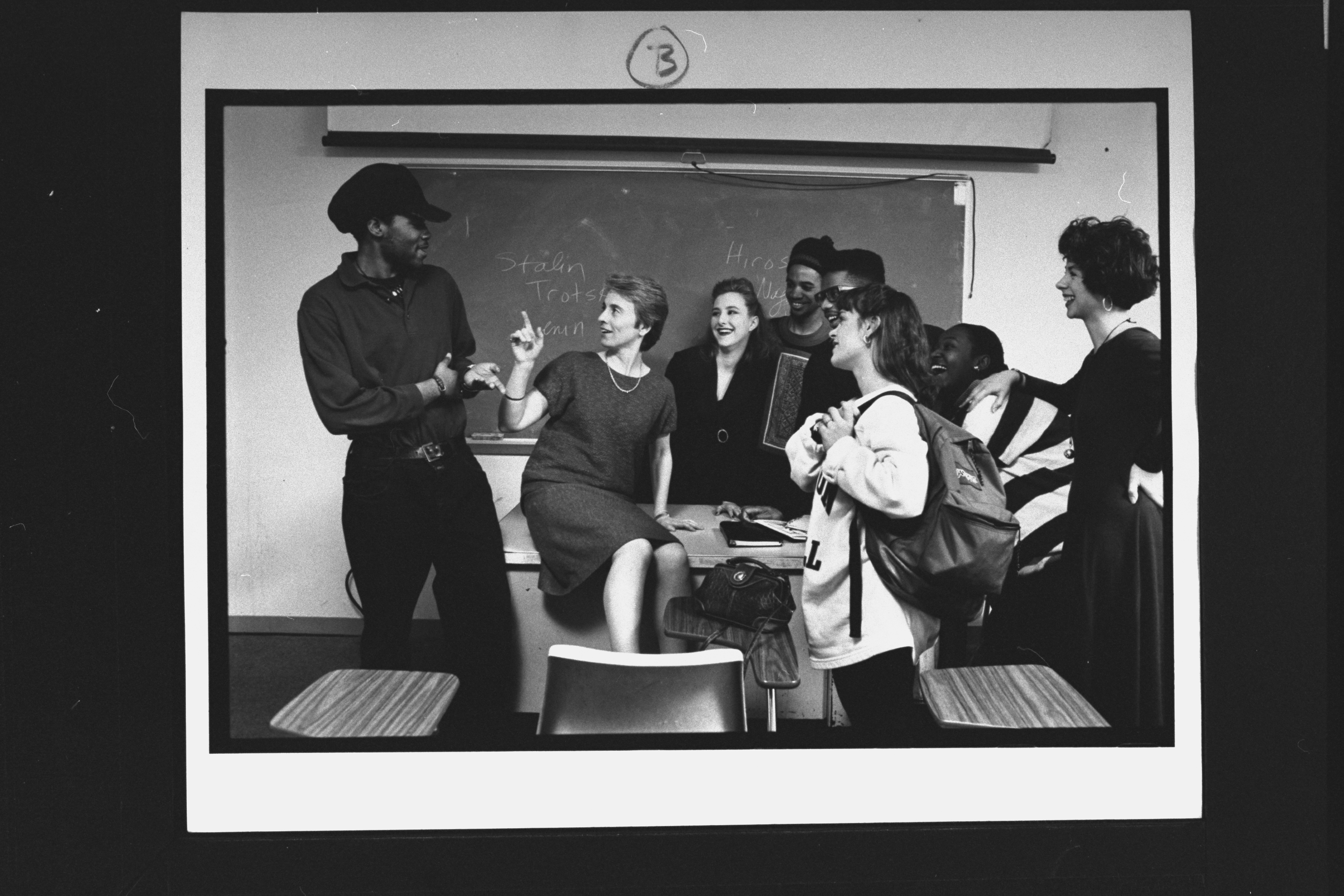Must Reads
A College President Stands Up for Academic Freedom
At Quillette we hope David Yager’s moral leadership becomes a turning point in the defence of free thought. We raise our glasses to him and to Philadelphia’s University of the Arts.

What happens when university students call on authority figures to censor students or staff at institutions of higher education? At Yale such students have been awarded prizes, at the University of Missouri they’ve been successful in forcing administrators to resign, at Claremont they were able to force their president to implement a long list of demands, and at Evergreen State College a throng of students were allowed to take control of the campus while harassed faculty sought refuge off-campus. At other colleges around America, and even on campuses in the U.K., Canada and Australia, university administrators have met illiberal student mobs with a parade of mealy-mouthed platitudes and prostrations. This pattern of weakness has been dismaying for all people who value academic freedom and open inquiry. This week, however, a line has been drawn by David Yager, President of Philadelphia’s University of Arts (UArts). In response to students calling for the censorship of Camille Paglia—one of the most admired humanities scholars in the world—he articulated a full-throated defence of intellectual freedom, showing administrators of supposedly superior universities what real leadership looks like.
To understand what happened, one has to go back in time to 2016, the year when Camille Paglia recorded an interview with Ella Whelan of the British magazine Spiked. In this interview, Paglia criticised the transgender and feminist activist movements in her usual colourful and provocative style. She queried whether every single case of transgenderism was genuine, and drew attention to the victimhood that mainstream feminism is preoccupied with. While controversial, Paglia’s comments reflected viewpoints shared by many people. Part of her popularity comes from saying what no-one else has the courage to say.
Yet it was only last week, after UArts student Joseph McAndrew—who identifies as “non-binary” and who stipulates their personal pronouns as they/their/them—began making posts on Facebook and Instagram, that a complaint against Paglia was made.
After McAndrew made their social media posts, a petition was created and a protest was organised during one of Paglia’s lectures on Nefertiti and Egyptian design, with a fire alarm being set off. The petition demanded that UArts sack Paglia, who has been a tenured faculty member since 1984, and replace her with a “queer person of colour.” The text of the petition reads as follows:
In recent interviews she has blatantly mocked survivors of sexual assault and the #MeToo movement, and in classes and interviews has mocked and degraded transgender individuals. She believes that most transgender people are merely participating in a fashion trend (“I question whether the transgender choice is genuine in every single case”), and that universities should not consider any sexual assault cases reported more than six months after the incident, because she thinks those cases just consist of women who regret having sex and falsely see themselves as victims.

This particular protest and petition fits the pattern of most recent calls for censorship in that the students appear to have little familiarity with Paglia’s work, if any.
While her work is hard to simplify and compress into a few neat sentences, anyone with a passing familiarity with Paglia’s career would know that transgressive ideas around sexual and gender expression is one of the central themes of her work. The notion that she “oppresses” transgender people is as ill-informed as it is illiterate.
* * *
Paglia’s career as an academic and public intellectual has coincided with the hollowing out of humanities departments by ideologues and activists intent on undermining the very principles that such departments were created to uphold. While English Studies lecturers joined the flock of Foucault worshippers in the ’80s and ’90s, Paglia maintained an interest in close-reading and the teaching of the Western Canon. An atheist who respects religion, an equal-opportunity feminist who admires men, and a libertarian progressive who understands the value of tradition, she is ready to smash orthodoxies while at the same time preserve the principles that underpin a liberal arts education.
Her fame has fluctuated with the political correctness of America’s cultural atmosphere. In the early ’90s, she became a celebrity as she pushed back against the stifling conventions of bourgeois feminists, and in recent years she has been increasingly sought out again as authoritarian, illiberal students, academics and administrators have stifled dissent on campuses and within academic and artistic communities. In an interview with Quillette last year, Paglia commented on the sad state of humanities departments:
I suspect history will not be kind to the leading professors who appear to have put loyalty to friends and colleagues above defending scholarly values during a chaotic era of overt vandalism that has deprived several generations of students of a profound education in the humanities. The steady decline in humanities majors is an unmistakable signal that this once noble field has become a wasteland.
Readers of Quillette will be familiar with the wasteland that Paglia describes. Academic fads like critical theory and intersectionality have transformed liberal arts schools into sclerotic indoctrination factories, where graduates have little appreciation of history or art, but instead chant robotic slogans in monotone voices.
* * *
On a podcast with Joe Rogan last year, the social psychologist Jonathan Haidt gave an intriguing explanation of the underlying logic that motivates such protests, likening them to a status game for the student-activists. You can’t understand these protests unless you think about the social milieu that these students exist in, and the incentives that reinforce their behaviour. After every social media post calling for someone to be censored or deplatformed, for ostensibly humanitarian or compassionate reasons, an activist will receive “likes” and attract more followers. A quick perusal of the social media posts of Joseph McAndrew, Camille Paglia’s self-appointed Torquemada, is a case in point.
The problem with status games is that they often turn toxic. They can be dangerous to the individuals who engage in them—whether it’s drinking games, drag races or boxing matches—and also toxic to outsiders. In his podcast with Rogan, Haidt likened this type of activism to the head-hunting rituals of teenagers in Melanesia or Papua New Guinea.
Status games notwithstanding, UArts president, David Yager, sharply rebuked this attempt at censorship in an email sent out to staff and students. It read:
Unfortunately, as a society we are living at a time of sharp divisions—of opinions, perspectives and beliefs—and that has led to decreased civility, increased anger and a “new normal” of offence given and taken. Across our nation it is all too common that opinions expressed that differ from another’s—especially those that are controversial—can spark passion and even outrage, often resulting in calls to suppress that speech.
That simply cannot be allowed to happen. I firmly believe that limiting the range of voices in society erodes our democracy. Universities, moreover, are at the heart of the revolutionary notion of free expression: promoting the free exchange of their ideas is part of the core reason for their existence. That open interchange of opinions and beliefs includes all members of the UArts community: faculty, students and staff, in and out of the classroom. We are dedicated to fostering a climate which is conducive to respectful intellectual debate that empowers and equips our students to meet the challenges they will face in their futures.
I believe this resolve holds even greater importance at an arts school. Artists over the centuries have suffered censorship and even persecution, for the expression of their beliefs through their work. My answer is simple: not now, not at UArts.
At Quillette we hope David Yager’s moral leadership becomes a turning point in the defence of free thought. We raise our glasses to him and to Philadelphia’s University of the Arts.
Claire Lehmann is the Editor-in-Chief of Quillette. Follow her on Twitter @clairlemon
Feature image: Photo by Mario Ruiz for People magazine’s profile of Camille Paglia published on April 20, 1992: “Controversy: Street Fighting Woman. Academic brawler Camille Paglia takes on the campus establishment“.






